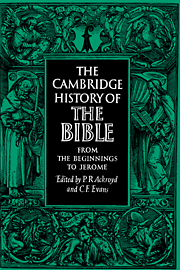Book contents
- Frontmatter
- I LANGUAGE AND SCRIPT
- II BOOKS IN THE ANCIENT WORLD
- 3 BOOKS IN THE ANCIENT NEAR EAST AND IN THE OLD TESTAMENT
- 4 BOOKS IN THE GRAECO-ROMAN WORLD AND IN THE NEW TESTAMENT
- III THE OLD TESTAMENT
- IV THE NEW TESTAMENT
- V THE BIBLE IN THE EARLY CHURCH
- Bibliography
- Abbreviations
- Notes on the Plates
- Indexes
- Plate Section">
- References
4 - BOOKS IN THE GRAECO-ROMAN WORLD AND IN THE NEW TESTAMENT
from II - BOOKS IN THE ANCIENT WORLD
Published online by Cambridge University Press: 28 March 2008
- Frontmatter
- I LANGUAGE AND SCRIPT
- II BOOKS IN THE ANCIENT WORLD
- 3 BOOKS IN THE ANCIENT NEAR EAST AND IN THE OLD TESTAMENT
- 4 BOOKS IN THE GRAECO-ROMAN WORLD AND IN THE NEW TESTAMENT
- III THE OLD TESTAMENT
- IV THE NEW TESTAMENT
- V THE BIBLE IN THE EARLY CHURCH
- Bibliography
- Abbreviations
- Notes on the Plates
- Indexes
- Plate Section">
- References
Summary
The world into which Christianity was born was, if not literary, literate to a remarkable degree; in the Near East in the first century of our era writing was an essential accompaniment of life at almost all levels to an extent without parallel in living memory. In the New Testament reading is not an unusual accomplishment; Jesus can clinch an argument with his opponents with ‘Have you not read—?’ (Matt. 12: 3; 19: 4; cf. 21: 42), and reading may be assumed to have been as general in Palestine as, from the vast quantity of papyri of all kinds and descriptions, we know it to have been in up-country Egypt at this time. The hellenisation of the Near East contributed powerfully to the more general use of the written word; but although where books were concerned the sophisticated Judaism of Alexandria was influenced by the hellenic elements it sought to proselytise (as can be seen in Philo), a widespread use of the book was something that hellenism and Judaism, even in its more ultramontane forms, had in common. Both Greeks and Jews used the roll as the vehicle for their literature, although the latter tended to prefer skin to papyrus for copies of the Law read in synagogues, while to the Greek the use of papyrus was one of the marks of civilisation. Both used the waxed tablet for elementary instruction in school as well as for memoranda. The discoveries at Qumrân and Murabba’ât have shown that certain scribal practices such as methods of cancellation or paragraphing by means of spacing were common to both, though probably Greek in origin.
- Type
- Chapter
- Information
- The Cambridge History of the Bible , pp. 48 - 66Publisher: Cambridge University PressPrint publication year: 1970
References
- 18
- Cited by

